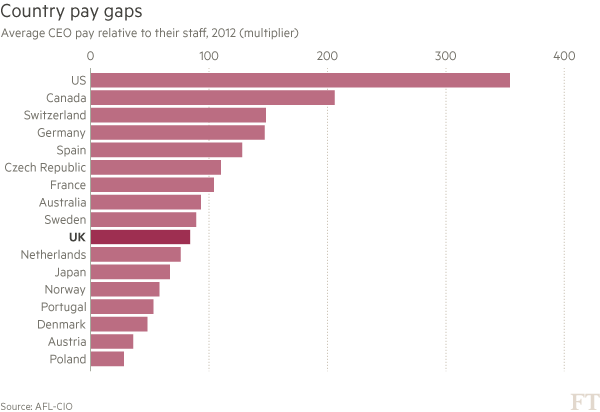So What Happened to That Talk About Reining in CEO Pay
Post on: 7 Июль, 2015 No Comment

Last February, amid public anger over millions in bonuses at bailed-out insurance giant AIG. our top national political leaders rushed to express their outrage — and even took some steps to place a lid on over-the-top executive pay.
That lid has now come off.
Treasury Secretary Timothy Geithner. with his just-released rules and proposals on executive pay, has essentially turned the specific executive pay limits that President Barack Obama announced and Congress legislated this past winter into mushy prescriptions that pose no real threat to the windfalls to which CEOs have so thoroughly become accustomed.
Remember that $500,000 cap on executive compensation that the White House announced back in February? That maximum has now become a minimum. Under the new Treasury rules, a new federal pay czar will automatically approve any paycheck from a troubled enterprise like AIG that doesn’t top half a million — and even allow with that paycheck additional compensation paid in the form of long-term restricted stock.
None of this backpedaling on executive pay reform should surprise us. Ever since the early 1980s, the years when pay for power suits first started pirouetting up, up and away, the pattern has become depressingly familiar. A CEO walks off with a windfall. A Wall Street highflyer hits an unimaginably massive jackpot. Editorial writers tut-tut. News magazines run cover stories about corporate greed. Lawmakers hold hearings and earnestly insist on pay for performance.
And nothing changes. The outrages just keep getting more outrageous.
Two decades ago, a commentator labeled Warner Communications CEO Steve Ross the prince of pay. Mr. Ross was averaging, in the 1980s, all of $16 million a year.
In 1993, Walt Disney CEO Michael Eisner took home $203 million. An outraged Business Week called that sum the most any CEO has made in a single year — or probably in an entire career in the history of American business.
Four years later, Mr. Eisner took home even more. He cashed out a stash of stock options and cleared $565 million, the biggest payday for an executive in history, The Washington Post exclaimed.
These days, that $565 million payday almost seems ordinary. In 2007, the financial world’s top 50 hedge fund managers averaged $581 million each.
We need to end, and soon, this endless escalation of what our power suits get to stuff in their pockets. We simply can’t afford to continue down the economic road we’ve been traveling.
Outrageously huge rewards, the economic meltdown of the past year has made perfectly plain, have no redeeming social value. They serve only to create incentives for outrageous behavior. We need to start discouraging that behavior — and we can. The best place to start: the federal tax code.
Right now, our tax code actually encourages excessive executive pay. The more companies shell out in executive bonuses and stock awards, for instance, the more they can deduct off their taxes.

Consider, for instance, Lockheed Martin, a company that feeds almost exclusively off government contracts. Lockheed recently announced that its CEO took home $26.5 million in 2008. Under current law, almost all of that $26.5 million qualifies as a tax deduction for the company.
One member of Congress, Rep. Barbara Lee from California, is moving to end taxpayer subsidies for excessive executive pay. Ms. Lee has introduced legislation, the Income Equity Act, which denies corporations tax deductions on any executive compensation that runs over $500,000 or 25 times the pay of a company’s lowest-wage worker.
Enacting this legislation, says Ms. Lee, would discourage skyrocketing pay at the top and encourage companies to raise the pay of workers at the bottom.
That pay at the bottom desperately needs raising. Average Americans today, after adjusting for inflation, are making less in weekly wages than they made back in the 1970s.
And that’s no accident. For three decades now, America’s corporate aristocrats have performed — and pocketed personal fortunes — by attacking the well-being of average Americans. Over those years, they’ve downsized workers and outsourced jobs. They’ve gutted pensions and benefits. They’ve hollowed out our middle class.
We need to start heading in a different direction. And quick.
Chuck Collins is a senior scholar at the Institute for Policy Studies in its Boston office, where he directs the Program on Inequality and the Common Good. Sam Pizzigati, an Institute associate fellow who lives in Kensington. edits Too Much, an online weekly on excess and inequality. They are co-authors of Executive Excess, a yearly report on CEO pay. This column originally appeared in the Baltimore Sun and is reprinted here with the permission of the authors.














